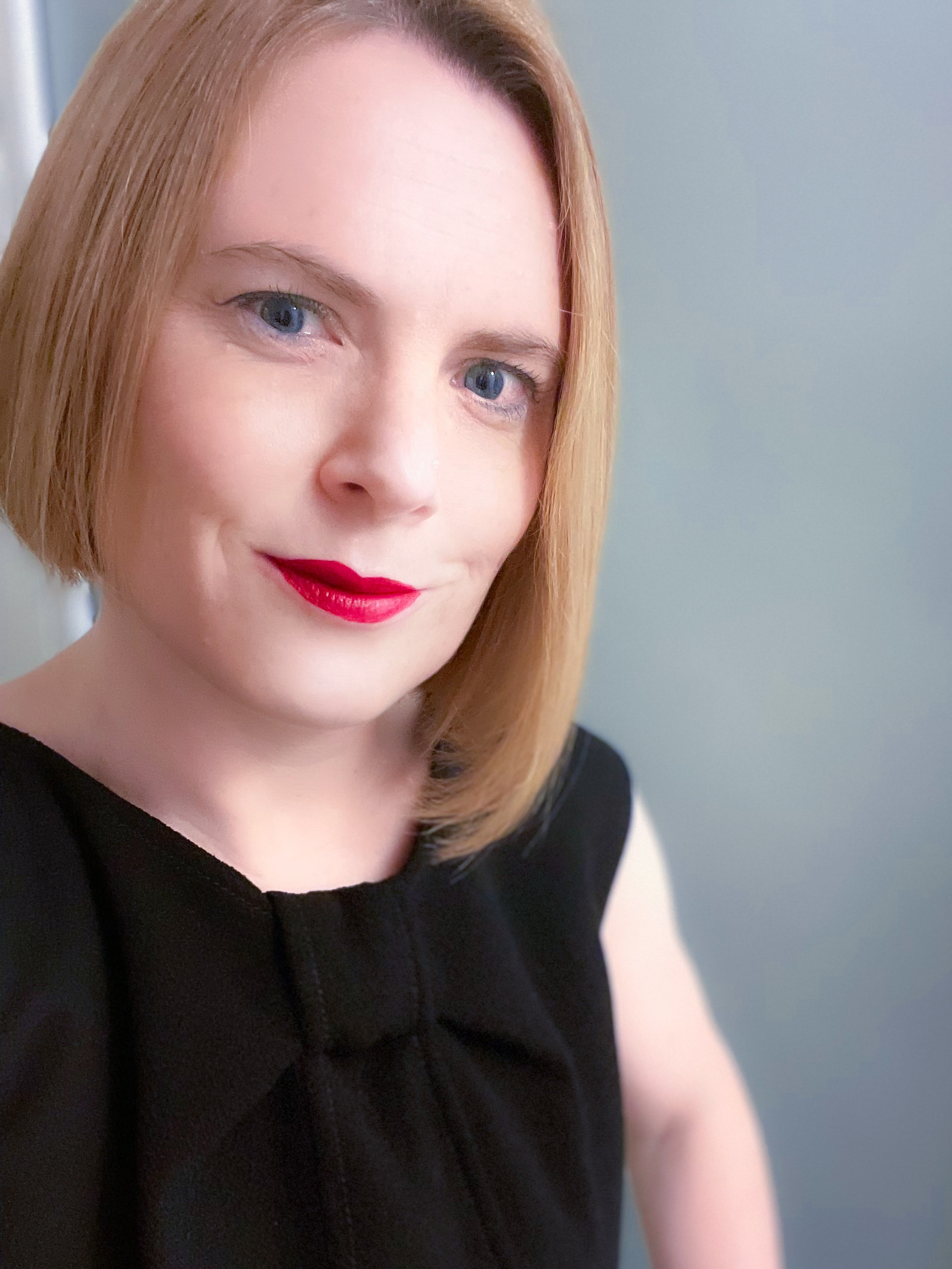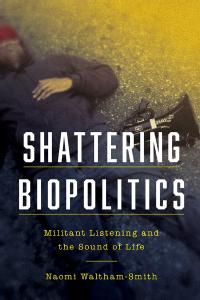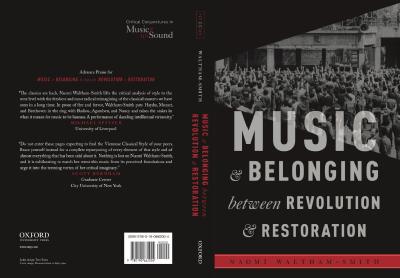Naomi Waltham-Smith (Reader)
Naomi Waltham-Smith (Professor)
I work at the intersection between sound studies and modern European philosophy and literary theory, especially deconstruction. I am interested in how aurality is imbricated in some of the most significant and urgent political issues in contemporary neoliberalism, including the impact of digital political economies on listening practices and the transforming conditions of vocality amid the crisis of political representation we are witnessing today. I use field recordings to explore urban ecologies of sound and their political significance and I also study sonic activism and political sound-art interventions.
My first book, Music and Belonging Between Revolution and Restoration (Oxford University Press, 2017) explores how the instrumental music of Haydn, Mozart, and Beethoven is implicated in a politics of belonging, understood in the double sense of inclusion and possession. Putting this music in dialogue with the thought of Derrida, Nancy, Agamben, and Badiou, it examines how aesthetics is always already unravelling in the direction of collective production.
My second monograph, Shattering Biopolitics: Militant Listening and the Sound of Life (Fordham University Press, 2021), develops my interests in the role of sound and listening in the philosophical tradition from Plato to contemporary French thought. It examines how sound is imbricated in the politics of life as it is theorised in the thought of Derrida, Cixous, Agamben, and Malabou, exploring the ramifications for the politics of sound, listening, and voice today.
In the wake of a resurgence of anti-racist organising on both sides of the Atlantic, I recently published my third monograph entitled Mapping (Post)colonial Paris by Ear (forthcoming with Cambridge University Press) that reinvents the bourgeois figure of the flâneur as a feminist-decolonial activist and configures listening as an expressly spatial practice of mapping the traces of France's colonial history in the quartiers populaires today. My fourth monograph is devoted to the topical questions of freedom of expression and academic freedom, approached somewhat novelly from the angle of listening. In 2023–24 I will be a fellow a Hanse-Wissenschaftskolleg working on a book project on “Crises of Disenchantment: Listening, Democracy, and the Clamours of Nationalism.”
In addition to these theoretical perspectives, my work also involves a field-recording and creative practice. For projects funded by the Mellon Foundation and a fellowship at the Akademie Schloss Solitude, I have used field recordings and sound walks as methods to investigate precarity, gentrification, and environmental issues. A sound and photograph installation entitled Anti-Fascist Silent DiscoLink opens in a new window, which was based on some of this research, was exhibited in Stuttgart in 2019 and a vitrine showcasing a project Out of Work funded by the Warwick Global Research Priority “Productivity and the Futures of Work”Link opens in a new window was on display in autumn 2020. In 2021 I co-curated a participatory project on “Sampling Sounds of Coventry's Future”Link opens in a new window with CIM colleague Noortje MarresLink opens in a new window and Nirmal Puwar (Goldsmiths) as part of Coventry City of Culture. I am currently engaged in a project “Learning to Listen: Unheard Voices in Urban Regeneration” based in Elephant and Castle working with Latin Elephant, members of sound-art collective Ultra-red, and local campaigners ESRC Impact Accleration Account
As well as being CIM’s Director of Postgraduate Taught programmes, I am currently Deputy Chair (Education) of the Faculty of Social Sciences. I am also an elected representative of the Assembly on the Senate with a commitment to listen above all to those voices most marginalised in our university community and sit on the University’s Council as Chair of the Academic Freedom Review Committee. I was humbled to have been nominated by students for and have won a Warwick Award for Teaching Excellence in 2021.
Further information: Personal siteLink opens in a new window, CVLink opens in a new window
Research Profile
Sound studies; recent French philosophy; politics of listening and democracy; urban sound ecologies; environmental humanities; philosophy of music; sonic art and activism.
Academic Profile
Prior to joining CIM in January 2019, I taught Music and Comparative Literature at the University of Pennsylvania (2012–2018). Before that, I held postdoctoral fellowships at City University and Indiana University, and taught at the University of Cambridge. I am a graduate of Selwyn College, Cambridge and King’s College London.
Current research projects
My ongoing empirical work deploys a creative praxis of field recording in combination with continental political philosophy to investigate urban sound ecologies and the conditions of aurality under neoliberal capital and with the rise of right populisms. I am continuing to develop work I started during a fellowship at the Akademie Schloss Solitude in 2019–20 on “Cart-otographies of Cities: Soundmapping Urban Political Economies.” For example, I undertook a year-long ESRC IAA-funded impact project with Latin ElephantLink opens in a new window and members of Ultra-red in Southwark. I am also working on a longer-term project on "Listening and Democracy: Theory, Practice, Crisis" and have funding from the British Academy and Leverhulme Trust to undertake archival work in France.
Future plans include a project on “ec(h)otechnics” that explores the technological modulation of listening and posthuman modes of aural attunement to the environment. An article beginning to explore this subject has been published in a special issue of Diacritics on “The Turn.”
Selected Publications
Monographs
Co-edited books and special issues
Co-edited with Alexander Rehding, A Cultural History of Music, vol. 5, The Industrial Age (1790–1914), (London: Bloomsbury) [in preparation].
Selected journal articles and book chapters
“Haydn’s Impropriety,” Journal of Music Theory 62, no. 1 (2018): 119–44.Link opens in a new window
“The Sound of the Outside,” boundary 2 43, no. 1 (2016): 75–105.Link opens in a new window
Modules Taught
IM937: Listening to Urban Waters

Contact
Centre for Interdisciplinary Methodologies
Room B0.05
University of Warwick
Coventry
CV4 7AL
Email: Naomi dot Waltham-Smith at warwick dot ac dot uk
Office hours: Click hereLink opens in a new window


